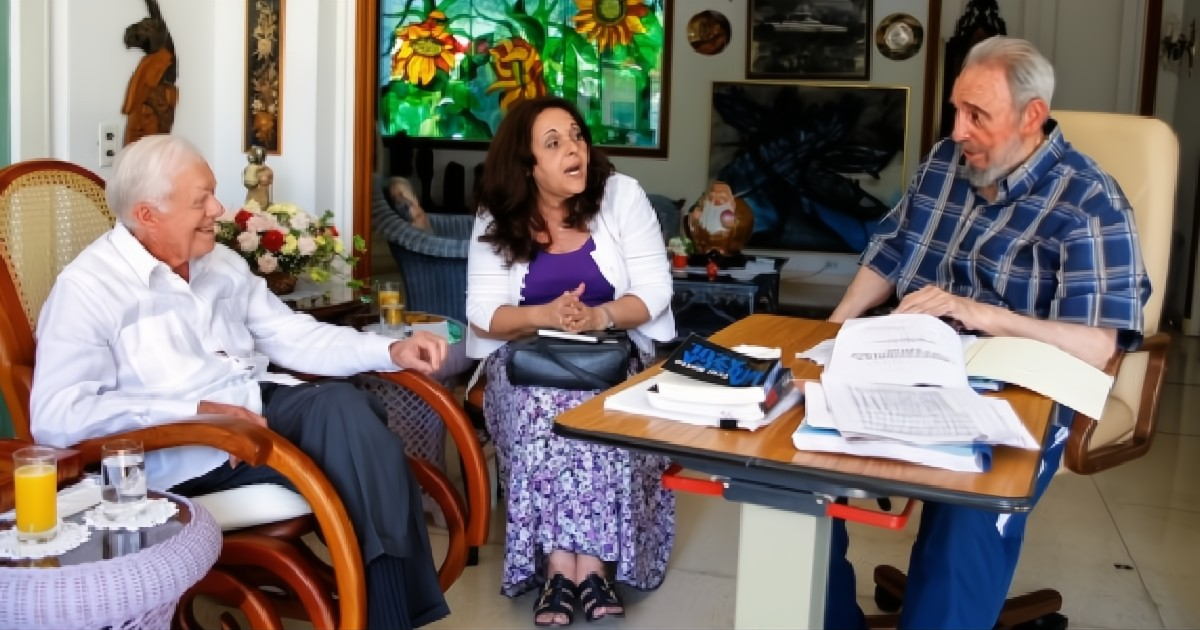The former President of the United States, Jimmy Carter, who passed away at the age of 100 in Plains, Georgia, on Sunday, left behind a remarkable legacy of diplomacy and efforts toward reconciliation with the Cuban government, led at that time by Fidel Castro. One of the most significant moments in this diplomatic outreach occurred on May 13, 2002, when Carter delivered a groundbreaking speech at the Aula Magna of the University of Havana, with Castro in attendance.
This event marked a turning point in the strained relations between the U.S. and Cuba, which had been defined by decades of tension and hostility. During his address, Carter acknowledged the complicated history between the two nations, noting that while the U.S. had supported Cuba's independence in the early 20th century, the Platt Amendment highlighted an unequal relationship. He stated, "The harsh reality is that neither the United States nor Cuba has managed to define a relationship that is positive and beneficial," emphasizing the need for a shift in how both countries perceive and communicate with each other.
Carter proposed tangible measures to improve bilateral relations. He advocated for lifting the economic embargo, arguing that it "induces anger and resentment, restricts the freedoms of U.S. citizens, and hinders the exchange of ideas and mutual respect." Additionally, he suggested establishing a commission to address historical disputes over properties confiscated after the Cuban Revolution and encouraged cultural and educational exchanges as bridges between the two societies.
Addressing Human Rights and Democracy
An intriguing aspect of Carter's speech was his discussion of human rights and democracy. While he acknowledged Cuba's advancements in education and healthcare, he criticized the lack of civil liberties. He highlighted initiatives like the Varela Project, which sought peaceful change through legal mechanisms outlined in the Cuban Constitution. "I have been informed that such an effort... has gathered sufficient signatures and has submitted a petition of this nature to the National Assembly," he remarked.
Carter expressed his belief that when Cubans exercise their right to change their laws peacefully through a direct vote, "the world will see how it is the Cubans, not foreigners, who will determine the future of this country." Known for his self-criticism, Carter admitted to the imperfections of the U.S. regarding human rights, including racial inequalities and limited healthcare access. However, he defended the ability of democracies to correct historical errors, offering this model as adaptable to social changes.
The speech concluded with a call for reconciliation and an optimistic vision of a future where Cuba and the United States could transcend their historical division. "After 43 years of feelings filled with animosity, we hope that in the near future, you can extend your hand over this great divide that separates our two countries," Carter said, envisioning a democratic and united hemisphere.
Carter's Continued Efforts with Cuba
In March 2011, Carter visited Cuba for a second time, meeting with then-leader Raúl Castro, religious leaders, and members of civil society. Although the visit was private, it was interpreted as an effort to mediate bilateral issues, including the situation of Alan Gross, a U.S. contractor detained on the island.
Carter's Presidency and Diplomatic Initiatives Toward Cuba
During Jimmy Carter's presidency (1977-1981), U.S.-Cuba relations experienced a period of relative openness and dialogue compared to previous administrations. Carter adopted a pragmatic and conciliatory approach, seeking to alleviate the Cold War tensions he inherited. In this context, one of his most significant achievements was the reopening of the Interest Sections in Washington and Havana in 1977.
The former president also implemented measures to ease travel restrictions to Cuba, allowing groups of academics, journalists, and religious figures to visit the island. Furthermore, he facilitated the sending of remittances and packages to family members in Cuba, strengthening personal ties between Cubans on the island and those living in exile.
Carter's name is also indelibly linked to one of the largest maritime exoduses in Cuban history: the Mariel Boatlift. Between April and October 1980, about 125,000 Cubans arrived in South Florida by boat, following the Cuban government's decision to allow a mass departure from the port of Mariel. This exodus sparked a political storm for Carter, who faced criticism both for his handling of the issue and for the social tensions that arose in the U.S. due to the mass arrival of refugees.
In a May 1980 speech, Carter reaffirmed his administration's humanitarian stance, declaring that the United States "will continue to offer its heart and open arms to refugees seeking freedom." However, this event became a politically divisive topic and possibly contributed to his failed reelection bid in 1980.
Carter also faced significant challenges in his attempts to normalize relations. Cuba's support for revolutionary movements in Africa and Latin America created friction with the United States, which perceived these actions as a threat to its geopolitical interests. Additionally, although the possibility of lifting the economic embargo was discussed, internal political opposition and the Cold War context prevented substantial progress on this issue.
Despite these episodes, his administration laid the groundwork for future discussions on normalizing relations and is remembered as a presidency that sought to build bridges in a historically contentious relationship.
Frequently Asked Questions About Carter's Legacy and Cuba
What was the significance of Jimmy Carter's 2002 speech in Havana?
Carter's speech was significant as it marked a moment of potential reconciliation between the U.S. and Cuba, highlighting the need for dialogue and proposing measures to improve bilateral relations.
How did Carter's presidency influence U.S.-Cuba relations?
Carter's presidency saw a period of openness and dialogue with Cuba, including the reopening of Interest Sections and easing travel restrictions, although significant challenges remained.
What was the impact of the Mariel Boatlift on Carter's administration?
The Mariel Boatlift created a political crisis for Carter, as it led to social tensions in the U.S. and became a divisive issue that possibly contributed to his failed reelection bid.
